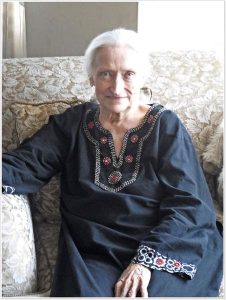[After learning last month of the sudden death of Dr. MJ Hardman, we asked Carl Brandon Society co-founder Victor J. Raymond to write about her crucial contributions to our ongoing work. Though already in the grip of grief due to the death of his mother, he gave us the following words.]
We had gathered for the first caucus of People of Color at WisCon, about twenty years ago. Nalo Hopkinson and Nisi Shawl were there — that I remember — and other members of what would become the Carl Brandon Society Steering Committee were there. Like other spaces I had been in before, we knew this was a special moment. There were about a dozen people there, and it felt like we weren’t huddled together for safety, for belonging. That day, the metaphorical tent walls lifted away from our shoulders; we had the space to be who we were and to talk freely.
We were about to start when a mature woman entered the room. She appeared to be white, so we were not immediately sure if she knew where she was. We waited for a moment, and then she said, “I’m not a person of color, but I am the mother of people of color.” We had not discussed how to handle this beforehand, but Nalo nodded and graciously invited her to join us. We could decide for ourselves who was a part of our community, and MJ immediately was included.
This is how MJ Hardman introduced herself to us. And from her we learned so much, oh, how we learned. MJ was an avid science fiction reader, a professor of linguistics, a fierce champion of indigenous rights, a mother, a feminist, and much more. MJ served on the Carl Brandon Steering Committee for nearly 15 years, and we benefited greatly from her presence and contributions.
MJ — for that was how we knew her, never as “Dr. Hardman” (she never stood on ceremony) — was a persistent advocate for unvoiced and underrepresented viewpoints in our work as the Carl Brandon Society. She worked to ensure that the Society’s efforts went beyond the United States, that we paid attention to writers and readers of color in other countries, and that we never forgot the feminist origins of our creation.
When we first began working on the Carl Brandon Parallax and Kindred Awards, MJ championed naming them as we did. “Parallax” — to recognize the breadth of who we were, the entire rainbow of the chromatic spectrum, and “Kindred” — first as an acknowledgment of Octavia E. Butler, an early supporter of our efforts, and second, to recognize that we were all associated, and connected to one another. We chose those names because MJ passionately advocated for them, and we soon realized why her advocacy mattered: they spoke to our shared values.
When the Society took on the challenge to support the Octavia E. Butler Memorial Scholarship for writers of color attending Clarion and Clarion West, it strained relationships amongst the members of the Steering Committee. MJ worked to mend those relationships, pointing out that fostering new voices in the field was an important thing for us to do — and there was nobody else who could do it. Over the past decade and more, we have seen the result of that wisdom: more than two dozen writers of color producing outstanding, brilliant creative work after graduating successfully from Clarion and Clarion West.
Over time, we slowly began to see the rest of MJ’s life. MJ saw connections between linguistics, worldview, and speculative fiction. How we speak influences how we think and how we see the world, now and in the future, and those connections were the foundation for her support for our work. I remember meeting her husband, Dimas, at WisCon; they clearly loved one another — Dimas, quiet and bespectacled, and MJ laughing and talking and challenging us to do the right thing (whatever it was in the moment). After knowing them for some time, I found out about his and MJ’s efforts to preserve Jaqaru, his native language. Because of that, it was possible to appreciate the connections MJ made between the important interests in her life. Once she retired from her position at University of Florida, she provided advice and support for the Society, and continued to advocate for, and on behalf of, the Parallax and Kindred awards.
For quite some time, the Carl Brandon Society operated on a shoestring budget — we still do, really. MJ’s academic work kept her focused on the needs of her community and family in Peru, but the Carl Brandon Society is a beneficiary of her estate. Her support will help build a stronger and more capable organization, one that she would be very proud of having helped to start.
Victor J. Raymond


